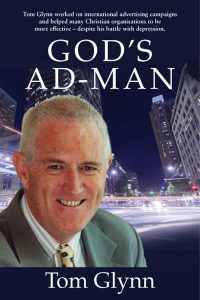
BOOK REVIEW
WORKING FOR THE GLORY OF GOD AMID “CHALK AND CHEESE” OF CHRISTIANITY AND ADVERTISING
A book review by Roy Williams
Tom Glynn: God’s Ad-Man
“The author is a thoughtful, intelligent Australian who devoted his working life to the advertising industry while attempting to reconcile that choice with his sincere Christian faith.”
There is a thought-provoking passage in Mere Christianity in which CS Lewis imagined what a fully Christian society would be like. Among other things, Lewis suggested, “there will be no manufacture of silly luxuries and then of sillier advertisements to persuade us to buy them”.
That was in the 1940s. Since then, across the West, material affluence and consumerism have grown exponentially, and advertising has become infinitely more sophisticated. These trends have coincided with plunging levels of Christian belief.
However regrettable, the brute fact in 2021 is that commercial advertising is, and has been for generations, an insidious aspect of Western life. It was therefore fascinating to read this autobiography. The author is a thoughtful, intelligent Australian who devoted his working life to the advertising industry while attempting to reconcile that choice with his sincere Christian faith.
Tom Glynn, started work in the ad game in January, 1957, as a 15-year-old messenger boy at a small Sydney firm called RS Maynard. He rose quickly and soon was hooked – on the glamour, the daily challenges, and the extreme competitiveness. By the early 1960s he’d advanced to the position of “assistant account executive” at a firm that was going places, Jackson Wain, handling accounts for the likes of Formica, IXL and White Wings.
Though not raised by believing parents, Glynn as a teenager had attended Dulwich Hill Baptist Church. He participated enthusiastically in Sunday school, Christian Endeavour and the Boys Brigade, but did not commit his life to Christ until the age of 21 – six years into his career in advertising.
His conversion experience is nicely described in God’s Ad-Man. It happened on a camping trip that he went on alone. He took with him three books: the Bible; Basic Christianity by John Stott; and a book of sermons by an American liberal Baptist preacher, highly influential in his day, Harry Emerson Fosdick.
Glynn writes: “I had time to reflect, whereupon I finally accepted Jesus, not because of my sins and as a pathway to heaven, but because of His life, ministry, death and resurrection, and as the One to follow. I was also impressed by Jesus’ disciples, who had witnessed his resurrection and who went on to claim that He was the Son of God. They kept the faith when facing death. I was also impressed by St Paul with his dramatic and life-changing conversion on the road to Damascus, and with his letters to small struggling churches in Asia Minor. ”
Glynn returned from the camping trip a changed person. After apologising to his mother for myriad domestic sins, and getting baptised, he “threw [him]self into a new mission – to bring the insights of advertising/marketing into the Church”.
In truth, that mission stalled for over a decade. Glynn spent the years 1962-73 honing his skills in the advertising industry with stints at Jackson Wain’s Singapore office; Hobson Bates & Partners in London (in which city he met his wife, Lynda, and worshipped at All Souls, Langham Place, in the heyday of John Stott himself); back at Jackson Wain in Sydney; and then – the peak of his secular career – at the prestigious, “blue-chip” J Walter Thompson. During this period he promoted scores of well-known products and rubbed shoulders with several brilliant Australian thinkers who spent their formative years in or around advertising, among them Donald Horne, Leo Schofield, Hugh Mackay, Richard Walsh, Bryce Courtney and Ken Done. (One name not mentioned is Phillip Adams, though he was Melbourne-based.)
Some of the time Glynn loved his job, but he was also frequently conscious of a clash between the realities of advertising and the dictates of Christianity. In his words: “Life in ad agencies with some creative and senior executives was often based on long boozy lunches, heavy drinking, sexual encounters and, in later years, drug taking. The commercial world of free enterprise, unbridled capitalism and materialism, and the teachings of Jesus Christ, were a little like chalk and cheese.”
Many lawyers, accountants, bankers and other corporate slaves in Australia nowadays who profess to be Christians will – or should – empathise with these thoughts.
By early 1974 Glynn was disillusioned. “I wanted to move from selling products to a person, Jesus Christ,” he explains. In a brave leap of faith, he opened his own firm, Tom Glynn Agency (TGA), championing an original business model: for a modest monthly fee, he would serve Christian organisations. His first two clients were the Anglican Home Mission Society (now Anglicare) and Scripture Union.
TGA was “put on the map” in 1975 by a wildly successful campaign for the US giant Thomas Organs (its Australian distributor was Open Air Ministries). The star of the campaign was the flamboyant American pianist Liberace, and filming took place in Las Vegas – it’s a terrific anecdote. At any rate TGA thrived and, for the next fourteen years, Glynn serviced a “Who’s Who” of Australian Christian bodies while also juggling regular commercial clients. He sold TGA in 1989, but stayed in the industry in various capacities for another two decades. It’s an impressive story, modestly told.
What lessons does Glynn draw? He’s a savvy man, and they are worth pondering.
For the church, the mass media is, he thinks, “a tempting but frequently self-deluded opportunity”. It tends to reinforce existing views rather than convert souls. “The Church’s golden opportunity,” he’s convinced, “is in interpersonal…communication”. Old-fashioned one-on-one interaction remains, he believes, the most effective evangelistic tool.
Another theme is that anyone’s work can be done for the glory of God. This, of course, was one of John Calvin’s main insights. But in Glynn’s view, in the modern world, it requires courage.
“Many working people,” he writes, “have a False Self, especially in sales, marketing and advertising”. He pleads guilty himself, and confesses to having suffered intermittently all his life from clinical depression. These parts of the book are especially honest and moving.
Glynn is grateful for having struggled. He quotes the words of another Christian author to have influenced his spiritual journey, the American priest Richard Rohr: “Normally the way God pushes us is by disillusioning us with the present mode. Until things fall apart, we will never look for something more…It seems to be the price we pay for the death of the small (False) Self and the emergence of the True Self – when we finally come to terms with our true identity in God.”
Roy Williams is the author of four books on Christianity, including ‘God, Actually’ and ‘Mr Eternity: The Story of Arthur Stace‘. Copies available from Koorong.

